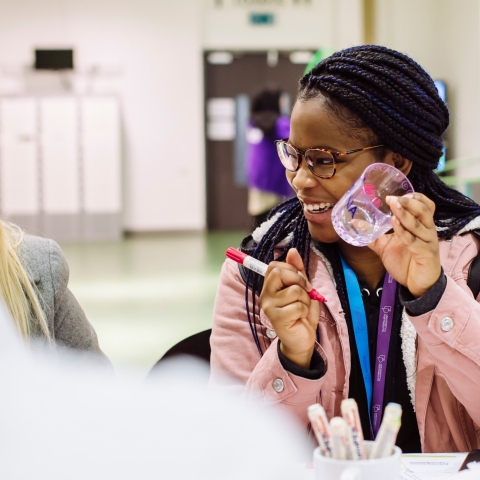
You can also speak to and get help from the NHS, and organisations and charities specialising in mental health outside the University. Here are our guides and resources on different topics to help you navigate your wellbeing.
Jump to:
Mental health services and charities
If you'd like to contact local mental health services or wider support outside the university, these are good places to start:
- Mental Health Portsmouth - a starting point for finding help with your mental health in the Portsmouth area, including accessing NHS services
- Mental Health London Campus a starting point for finding help with your mental health local to the London Campus in Walthamstow, including accessing NHS services
- Kooth - free, safe, online, anonymous counselling and emotional support service for anyone aged up to 25. Access 1:1 text- based counselling sessions, 24/7 messaging service, forums, articles, journalling and goal setting features to help you take care of yourself.
- Talking Therapies - refer yourself to local NHS experts for talking therapies to help with issues like anxiety, depression and low mood.
- Student Space - expert information and advice to help you through the challenges of student life.
- Solent Mind provides a breadth of mental health and wellbeing services in Portsmouth, including one-to-one peer support, wellbeing groups, workshops and the online teaching of practical skills for living with ongoing symptoms at Solent Recovery College.
- Mind - a national charity supporting people with mental health
- Young Minds - a national charity offering mental health support for young people under 25
Resources and guides
Guides and resources on different topics that can help you navigate mental health.
Are you concerned about the amount of alcohol you use, or is your drinking negatively affecting your studies or other areas of your life?
Would you like to stop or reduce to a level you are happier with? Whatever your concerns, whatever your goals - there is support available.
You can access advice and support from us at Student Wellbeing as a first step. At any time, you can also consult your GP or seek specialist support from external services.
You should also let your personal tutor or course leader know if you are having difficulties and these are affecting your studies – they are there to help, and can offer useful advice and support.
Useful resources for alcohol
General health guidance about how to reduce the amount you drink.
The Portsmouth Recovery Hub is a one-stop, confidential, adult drug and alcohol treatment service available to anyone who lives in Portsmouth who is concerned about their own, or a friend or family member’s drug and/or alcohol use. The Hub also has a specialist service for adults aged 18 - 25.
Family group support for anyone whose life has been affected by someone else's drinking, where members can share their own experience of living with alcoholism. A local Portsmouth group meets weekly.
Anxiety is a very common issue, affecting many students. It is common to try to deal with anxiety by avoiding the situations that feel like they are causing these feelings.
Avoidance may feel like it gives temporary relief, but in fact it makes the problem worse.
It's always advisable to let your personal tutor or course leader know if you're having difficulties affecting your studies – they are there to help, and can offer useful advice and support. It's also worth talking to friends or other students to see if they can offer support e.g. by going to classes together.
You can also learn skills to help you deal better with anxiety, and there is a lot of other support available.
Useful resources for anxiety
Get self help advice on anxiety
How to use effective Cognitive Behavioural Therapy (CBT) strategies for understanding your anxiety and making positive changes to manage it.
Get self help advice on health anxiety
Health anxiety can make us worry about and be preoccupied with being seriously ill. Here's advice on how to break the cycle.
Get self help advice on social anxiety
It's easy to worry about what others think of us, and make assumptions about how we come across. Here are some strategies for managing unhelpful thoughts.
Low mood and depression are very common issues, affecting many students.
Depression is a serious and potentially debilitating condition, which can, on occasion, be life threatening. If you think you are experiencing depression it's important that you seek help as soon as possible.
It is advisable to speak with your GP if you are feeling persistently low, especially if your daily functioning is significantly affected. You should also let your personal tutor or course leader know if you are having difficulties affecting your studies - they are there to help, and can offer useful advice and support. If you are contemplating hurting yourself, urgent support is available.
You can learn skills to help you manage low mood and milder depression, and there are a lot of other resources available that can help to manage moderate to severe depression.
You can access advice and support from us at Student Wellbeing as a first step, and we can also help you access appropriate NHS mental health services, where relevant. At any time, you can also consult with your GP, or seek specialist support from external services.
Useful resources about depression
Info about how depression works and why it arises, along with step by step advice for self-help strategies, as well as guidance about getting the most from different support and treatment.
Campaign Against Living Miserably
A UK-wide campaign to unite against suicide, including a helpline, live chat, and practical info to help you move forward.
Centre for Clinical Interventions
The Centre for Clinical Interventions is a specialised clinical psychology service.
Get free, safe and anonymous support.
Do you use drugs to cope with the problems in your life or are you concerned about your drug use? If it is negatively impacting your studies, day-to-day life or relationships there is support available.
You can access advice and support from us at Student Wellbeing as a first step, or at any time consult your GP, especially if you are feeling persistently low, or if your difficulties are significantly affecting your daily functioning. You can also seek specialist support.
You should let your personal tutor or course leader know if you are having difficulties affecting your studies - they are there to help, and can offer useful advice and support.
Useful resources on drugs
Drug and Alcohol Support Service for young people
The Drug and Alcohol Support Service (DASS) works with young people under 25 in Portsmouth who are using substances. The service is free and confidential.
The Portsmouth Recovery Hub is a one-stop, confidential, adult drug and alcohol treatment service available to anyone who lives in Portsmouth who is concerned about their own, or a friend or family member’s drug and/or alcohol use. The Hub also has a specialist service for adults aged 18 - 25.
A national organisation offering non-judgemental, up-to-date information about a wide range of drugs and substances. You can also call them on 0800 77 66 00 or text 82111.
National mental health charity Mind offers a range of information and support about recreational drugs.
Access drug and alcohol support services in the Portsmouth area.
Access this free drug and alcohol service run by London Borough of Waltham Forest council.
For many of us food isn't just fuel, it also carries layers of social and cultural symbolism, as well as personal psychological meaning.
Social media can often focus on image and body-consciousness, so it is no surprise that food can become a symptom or source of emotional distress. Distress around food and eating is a relatively common issue for many students.
If you feel that your relationship with food has become a source of distress or difficulty, it is a good idea to seek help as soon as possible.
You should let your personal tutor or course leader know if you are having difficulties affecting your studies - they are there to help, and can offer useful advice and support.
You can access advice and support from us at Student Wellbeing as a first step, and we can also help you access appropriate NHS mental health services, where relevant. At any time, you can also consult with your GP, or seek specialist support from external services.
If you think you may have an eating disorder then it is important to speak with your GP.
You can also learn skills to help you manage low mood and milder depression, and there are a lot of other resources available that can help to manage eating difficulties.
Useful resources for food issues
National charity providing information on eating disorders as well as helplines, online support and a network of UK-wide self-help groups for people affected by eating disorders.
Mind is a national charity supporting people with their wellbeing, including offering information on eating problems.
Student Minds specialise in support for students, including those experiencing difficulties around food and eating.
An online support group for students with eating difficulties and disorders.
Centre for Clinical Interventions
The Centre for Clinical Interventions is a specialised clinical psychology service.
Experiencing the loss of someone important to us is a challenge that we all face at some time in our lives, whether through the death of a loved one, or through the ending of an important relationship. But knowing that others have experienced something similar doesn't necessarily make the pain any easier to manage.
You may find that friends and others are uncomfortable and don't know how best to support you, and you (or others) may impose unrealistic expectations about how quickly you should be 'moving on'. There is no set timetable for how bereavement or loss affects someone, and no set formula for how to get through it, but it is a good idea to make sure you have some kind of support.
It is always advisable to let your personal tutor or course leader know if you are having difficulties affecting your studies – they are there to help, and can offer useful advice and support. Consult your GP if you are feeling persistently low, or if your difficulties are significantly affecting your daily functioning beyond the initial aftermath of the loss.
Useful resources for loss and bereavement
Local support for bereaved people, including free 1-to-1 counselling, support, friendship and social groups, and life coaching.
Survivors of Bereavement by Suicide
This self-help organisation supports those bereaved by the suicide of a close relative or friend. There's a confidential helpline, information leaflets, support by e-mail, group meetings (including a Portsmouth branch), and events.
Large charity that promotes the wellbeing of bereaved people, helping people to understand their grief and cope with their loss.
Learn more about loss, and how you can support yourself through it.
Free and confidential support following suicide, for as long as you need it.
Self-harm is more common than many people realise, especially among young people. You can learn skills to help you turn to healthier coping strategies, and there is a lot of other support available to manage self-harm.
If you or a friend need NHS medical care for treatment, advice and information, please contact 111, attend the Urgent Treatment Centre and Minor Injury Unit at St Mary's Hospital east of the University of Portsmouth Campus, or see our Urgent Support pages for further advice.
If you are considering suicide or feel you are at risk of acting on suicidal thoughts, please see the Urgent Support page.
You can access advice and support from us at Student Wellbeing.
It is always also advisable to consult your GP about a habit of self-harm or if you are feeling persistently low, especially if your daily functioning is significantly affected.
Let your personal tutor or course leader know if you are having difficulties affecting your studies – they are there to help, and can offer useful advice and support.
Useful resources for self-harm
Information on possibly causes for self-harm, how to access treatment and support, and tips for helping yourself or others.
A free app for Google or Apple phones that helps you manage or resist the urge to self-harm.
Developed to help people stay safer from thoughts of self-harm or suicide.
A dedicated helpline providing free, confidential support to individuals struggling with mental health concerns.
There are a variety of factors which can contribute to sleep problems, including noise, late nights, and variable routines. For some people, sleep difficulties can trigger or accompany more serious issues such as stress, anxiety, low mood or depression.
If you are having persistent difficulties with sleep then it is advisable to seek help. Consult your GP if your daily functioning is significantly affected and let your personal tutor or course leader know if your difficulties are affecting your studies.
For good health and wellbeing, it is important to try to develop healthy routines, with regular meals, exercise and sleep times. You can learn skills to help you tackle sleep problems, and there is a lot of advice and other support available.
Useful resources for sleep
Information on the connection between sleep and mental health, and practical suggestions and information on where to get support.
Speak to trained sleep advisers on Monday, Tuesday and Thursday evenings, or some mornings.
Tips on how to improve your sleep, during the day, in the evening and when getting ready for bed.
When we're in a situation that we don't feel we can manage or control, like juggling work and responsibilities, we can often feel stressed. A small amount of stress can be manageable and help us focus on a problem. But stress that's very intense or lasts for a long term can start to cause wider problems.
If you are having persistent difficulties with stress then it is advisable to seek help. Consult your GP if your daily functioning is significantly affected and let your personal tutor or course leader know if your difficulties are affecting your studies.
Useful resources for stress
Understand how stress can affect you, and where to get support.
Resources for managing exam stress at university.
Other resources
Urgent support
If you need support urgently, all the important contacts are here.

Support from Student Wellbeing
Available to students in Portsmouth and London, find free mental health, wellbeing and counselling services including daily advice sessions, personalised 1:1 support, and other resources and guides.

Wellbeing workshops, events and groups
Get involved in the free wellbeing support available for you at uni, including support groups, drop-in events, workshops and the annual Feel Good Fest.

Enable University alerts
Turn on notifications for critical updates like closures, safety alerts, and urgent service disruptions.








